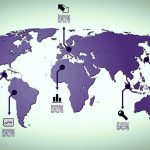It is that time of the year again, and 2017 is over before we knew it. The Year of Intelligence brought us a lot of progress and change; from over-hyped ICO's to algorithms that created secret languages. As every year since 2012, I provide you with seven of the most important technology trends for 2018 to help you, and your business, prepare for the next year. Click here if … [Read more...] about The Top 7 Technology Trends for 2018
Big Data
Learn everything you need to know about big data. Find out how companies are using this revolutionary technology and what it means for your business strategy.
Do We Need to Sacrifice Our Privacy for Big Data?
I was talking to a programmer friend the other day. He helps develop actuarial algorithms for insurance companies. He is constantly pointing out that his algorithms are beneficial to insurance companies and beneficiaries alike. They are necessary to set fair premiums. He had a slight change of tune the other day. His own insurance rates went up by 10% because of a discovery … [Read more...] about Do We Need to Sacrifice Our Privacy for Big Data?
How Successful Franchises use Data Analytics
Big data is everywhere and franchises would be fools to ignore the vital information that could break them or make them. There are almost limitless opportunities to use data for commercial gain when creating a product, service, website or marketing campaign. However, care has to be taken to under the insights provided. Predictive analytics software helps to take a business … [Read more...] about How Successful Franchises use Data Analytics
How to Leverage Data in “Non-Data” Markets
Modern finance relies heavily on credit scores, a statistical number which signifies a consumer's creditworthiness. These credit scores are based on payment and credit history, accumulated via digital payment and banking methods. A credit score is necessary to be able to buy a house, finance a car, or even to be approved for shopping online. Consumers with high credit scores … [Read more...] about How to Leverage Data in “Non-Data” Markets
High (Tech) Anxiety: Why Individuals And Corporations Worry About Big Data
For the past several years, headlines have heralded the IoT as a game changer that will transform workplaces, optimize cities, and help individuals lead more efficient, healthier lives. And while this is very much true, it's hard to deny the fact that the IoT also amplifies stress and anxiety by exposing individuals and organizations to additional risk. How we handle this … [Read more...] about High (Tech) Anxiety: Why Individuals And Corporations Worry About Big Data
What is big data?
Big data is a term that refers to the massive amount of digital data created and shared every day. Big data can transform how we live, work, and communicate. It can be used to improve everything from public health and urban planning to business and marketing.
Big data is also changing the way we think about privacy and security. The volume, velocity, and variety of big data present challenges and opportunities for organizations and individuals. Regardless, big data is here to stay, and its impact will only continue to grow in the years to come.
What is big data analytics?
Big data analytics is the process of turning large, complex data sets into actionable insights. Businesses use various analytical tools and techniques, including machine learning and statistical analysis, to do this.
Big data analytics can be used to improve decision-making in areas like marketing, operations, and customer service. It can also be used to identify new business opportunities and optimize existing processes. With the help of big data analysis, businesses can gain a competitive edge by using their data better.
Want to learn more about big data? Datafloq has courses available. Contact us to get started.
When was big data introduced?
The term big data was coined in the 1990s, with some giving credit to John Mashey for popularizing the term. However, the concept of big data has been around for much longer.
Where does big data come from?
In the early days of computing, scientists and businesses began to realize that the amount of data being generated was increasing exponentially. As a result, they began to develop new methods for storing and processing data.
Over time, these methods have become increasingly sophisticated and have played a key role in enabling businesses to make sense of vast amounts of information. Today, big data is used in various industries, from retail to healthcare, and its importance is only likely to grow in the years to come.
What are examples of big data?
One of the most common examples of big data is social media data. With over 2 billion active users, Facebook generates a huge amount of data every day. This includes information on user interactions, posts, and even location data. Analyzing this data can help companies better understand their customers and target their marketing efforts.
Another example of big data is GPS signals. These signals are constantly being generated by devices like cell phones and fitness trackers. When combined with other data sets, GPS signals can be used to provide insights into everything from traffic patterns to human behavior. Finally, weather patterns are another type of big data set. By tracking these patterns over time, scientists can better understand the impact of climate change and develop strategies for mitigating its effects.
How do companies use big data?
Companies use big data in marketing, product development, and customer service. By analyzing large data sets, businesses can identify patterns and trends that would be otherwise difficult to spot. For example, a company might use big data to track customer behavior patterns to improve its marketing efforts.
Alternatively, a company might use big data to improve its products by identifying areas where customers are most likely to experience problems. For instance, big data can be used to improve customer service by finding pain points in the customer journey. Ultimately, big data provides companies with a valuable tool for gaining insights into their business operations.






